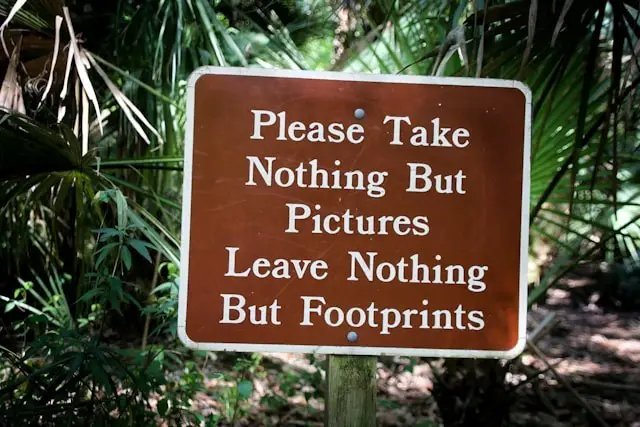Ready for your next trip in the Carolina’s but want to travel responsibly and lessen your travel footprint? Awesome!
Traveling provides us with the unique opportunity to explore and appreciate the natural beauty and cultural heritage of different places. However, it is crucial to travel responsibly to ensure that these destinations remain pristine and enjoyable for future generations. Here are some key principles for traveling responsibly in the Carolina’s, with a particular focus on respecting nature and adhering to the “pack out what you pack in” ethos.

Tips for Traveling Responsibly When Visiting the Carolina’s
Respect Nature and Pack Out What You Pack In
1. Respect Wildlife and Natural Habitats
One of the fundamental principles of responsible travel is respecting the natural environment and its inhabitants. Avoid disturbing wildlife by keeping a safe distance and not feeding animals. Feeding wildlife can disrupt their natural feeding habits and make them reliant on human food, which can be harmful. Stick to marked trails to avoid damaging delicate ecosystems and trampling native plants.
2. Leave No Trace
The “Leave No Trace” principle is a cornerstone of responsible travel. This means that whatever you bring into a natural area, you must take out with you. This includes all trash, food waste, and personal items. By packing out what you pack in, you help to keep natural areas clean and free from pollution. Leaving no trace is one of the top things you can do to travel responsibly in the Carolina’s.
Tips for Practicing Leave No Trace:
- Bring Reusable Items: Use reusable water bottles, food containers, and shopping bags to minimize waste.
- Proper Waste Disposal: Carry a small trash bag with you to collect your waste and dispose of it properly once you find a trash bin.
- Biodegradable Products: When camping or hiking, use biodegradable soap and toothpaste to reduce the environmental impact.
3. Minimize Campfire Impact
Campfires can cause lasting damage to natural areas if not managed properly. Use established fire rings, keep fires small, and ensure they are completely extinguished before leaving. Alternatively, consider using a camp stove for cooking to reduce the impact on the environment. Camping is my families favorite thing to do, and campfires naturally go with that. But we always use established spots to help travel responsibly in the Carolina’s.
Read Also: Family-Friendly Campgrounds in SC: 21 Top Picks
Related: 19 Family-Friendly Campgrounds in NC
4. Travel in Small Groups
Traveling in smaller groups minimizes the impact on natural areas and helps preserve the tranquility of the environment. Large groups can cause more wear and tear on trails and disturb wildlife more significantly.
5. Conserve Water and Energy
Being mindful of resource consumption is another key aspect of responsible travel. Take short showers, turn off lights and electronics when not in use, and use water-saving techniques, such as turning off the tap while brushing your teeth. Many eco-friendly accommodations also provide guidelines to help guests conserve resources.
Responsible Travel in the Carolina’s- Respect Cultural and Natural Heritage & Shop Local
6. Respect Cultural and Natural Heritage
When visiting cultural sites and natural landmarks, treat them with respect. Do not remove natural or cultural artifacts, as these are part of the heritage that makes these places unique. Follow all posted signs and guidelines to help preserve these sites for others to enjoy and travel responsibly in the Carolina’s.
7. Support Local Communities
Supporting local businesses helps sustain the economy and reduces the environmental impact of transporting goods. Buy local products, eat at locally-owned restaurants, and use local guides to enrich your travel experience and benefit the community.
Takeaways
Traveling responsibly means being conscious of our environmental impact and taking steps to minimize it. By respecting wildlife, adhering to the Leave No Trace principles, minimizing campfire impact, traveling in small groups, respecting cultural and natural heritage, conserving water and energy, and supporting local communities, we can ensure that our travel experiences are both enjoyable and sustainable. Remember, the natural beauty and cultural richness of our travel destinations depend on our commitment to preserving them. Always travel responsibly in the Carolina’s!
For more tips and detailed guides on traveling responsibly, you can visit resources like Green Travel Tips (The Ultimate Guide to Sustainable Travel), Lonely Planet, and What is Sustainable Travel: 8 Best Practices – Ecobnb.

